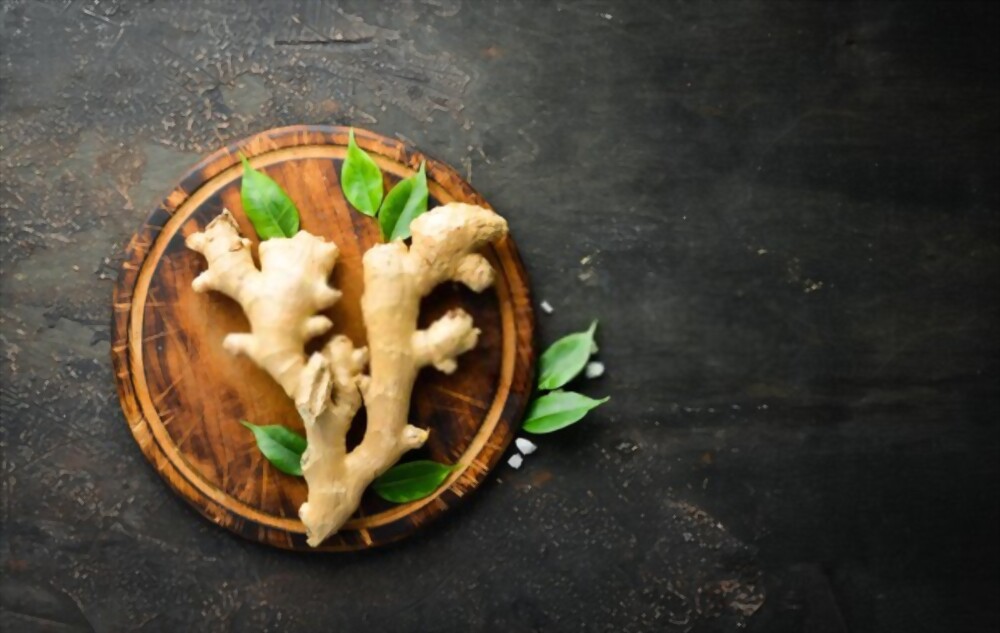What Exactly Is Ginger?
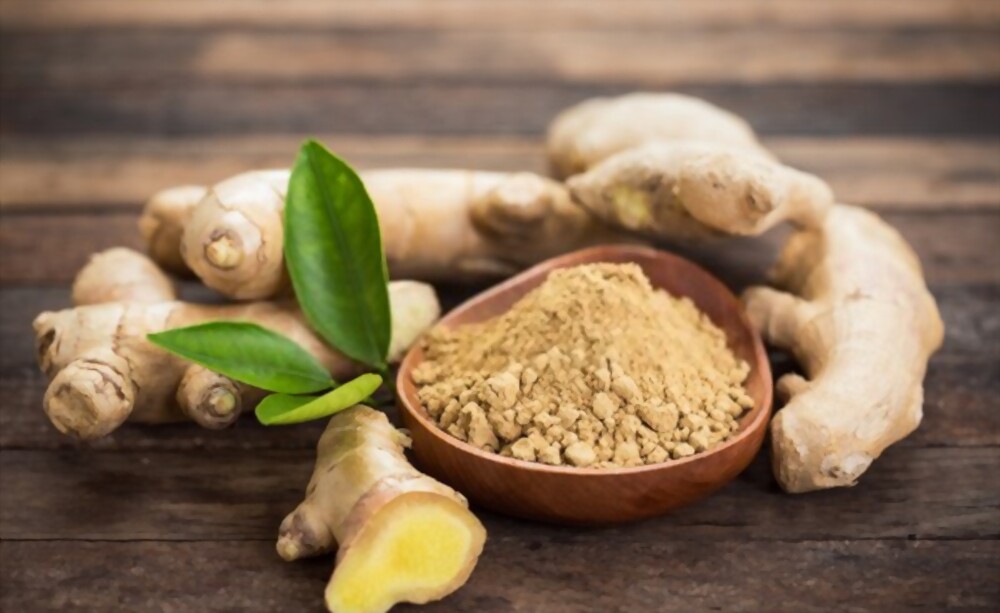
Ginger is a shrub with yellowish-green blooms and leafy stalks. The ginger spice originates from the plant’s roots. Ginger is native to Asia’s warmer regions, such as China, Japan, and India, but it is currently produced in South America and Africa. It is currently grown throughout the Middle East for medicinal and culinary purposes.
Motion sickness, morning sickness, colic, upset stomach, gas, diarrhoea, irritable bowel syndrome (IBS), nausea, nausea caused by cancer therapy, nausea produced by HIV/AIDS medication, nausea and vomiting after surgery, as well as loss of appetite are all typical uses for ginger.
Rheumatoid arthritis (RA), osteoarthritis, menstrual discomfort, upper respiratory tract infections, cough, respiratory difficulties, migraine headache, bronchitis, and diabetes are among the other conditions for
which it is used.
Ginger is also used to treat chest discomfort, low back pain, and stomach pain, as well as anorexia, to promote breast milk, as a diuretic, and to enhance perspiration after stopping the use of selective serotonin reuptake inhibitors (SSRIs).
Cholera, bleeding, bacterial bloody diarrhoea, baldness, malaria, swollen testicles, deadly snake bites, and toothaches are all treated with it. Some individuals use fresh juice to heal burns on their skin. Ginger oil is occasionally applied to the skin to help alleviate discomfort. Insect bites can also be avoided by applying the ginger extract to the skin.
Ginger is used as a flavour ingredient in foods and beverages. Ginger is used as a scent in soaps and cosmetics production.
One of the compounds found in ginger is utilised in laxatives, anti-gas, and antacid medicines.
History
The Analects of Confucius, written during the Warring States period (475–221 BC) in China, contain the first written record of ginger. Confucius was believed to take it with each meal, according to the book.
Ginger was produced in pots and transported on Chinese ships to avoid scurvy, according to the monk Faxian in 406 AD. Ginger was transported into China from the southern regions during the Song Dynasty (960–1279). The Arabs brought ginger to the Mediterranean, and Dioscorides (40–90 AD) and Pliny the Elder (24–79 AD) recorded it.
Ptolemy recorded the production of ginger in Ceylon around the year 150 AD (Sri Lanka). During the Middle Ages, raw and preserved ginger was brought to Europe. A pound of ginger was worth the same as a sheep in 14th-century England.
Horticulture

Ginger produces yellow blooms from clusters of white and pink flower buds. It is frequently used as landscaping around subtropical residences due to its visual appeal and adaptability to warm conditions. It’s a reed-like perennial with annual leafy stems that grows to approximately a metre (3 to 4 feet) tall.
When the stalk withers, the rhizome is traditionally taken and scalded or cleaned and scraped, to destroy it and prevent sprouting. Bantu sweetmeats, condiments, and sialogogues are made from the aromatic
perisperm of Zingiberaceae.
What is the mechanism behind the working of Ginger?
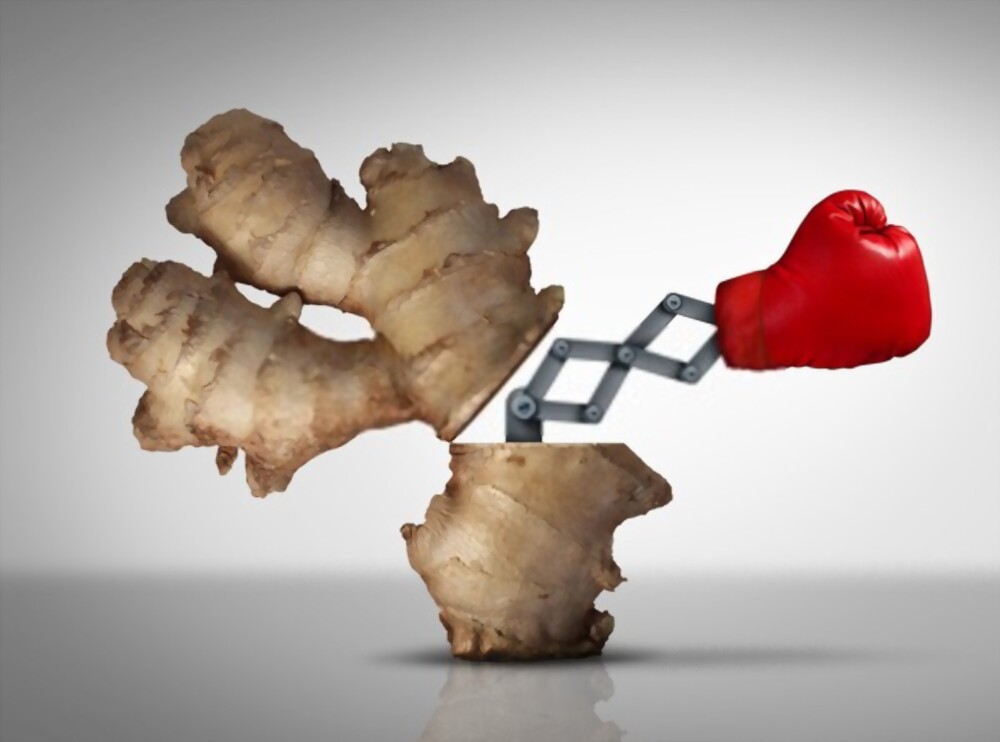
Ginger includes anti-nausea and anti-inflammatory compounds. The molecules are thought to function largely in the stomach and intestines, but they may also influence nausea in the brain and neurological system, according to researchers.
Applications And Effectiveness
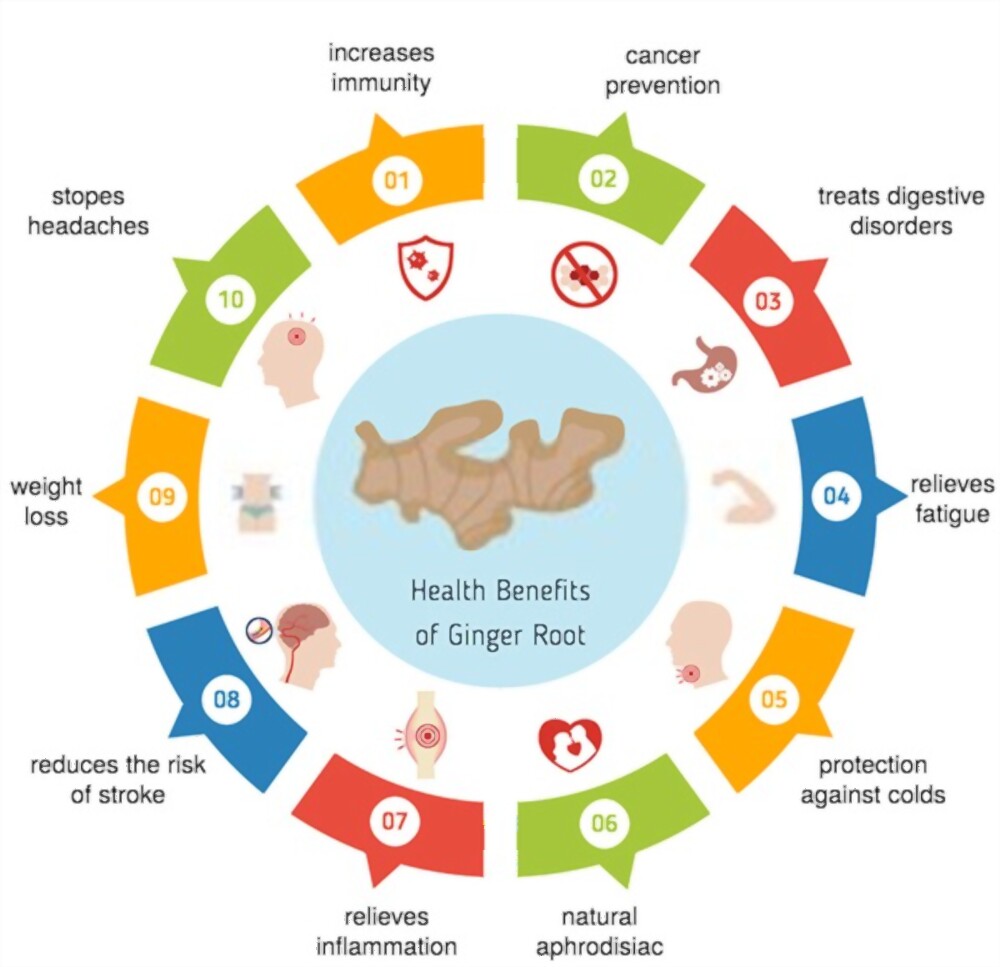
Nausea and vomiting induced by HIV/AIDS therapy may be helped with this supplement. According to research, eating ginger daily for 14 days, 30 minutes before each dosage of antiretroviral therapy, decreases the incidence of nausea and vomiting in HIV patients.
Periods of menstruation that are excruciatingly painful. According to studies, consuming 500-2000 mg of ginger powder during the first 3-4 days of a menstrual cycle reduces pain in women who have painful periods. 500 mg of ginger three times a day and 250 mg of a particular ginger extract (Zintoma, Goldaru) four times daily are two dosages that have been used.
Ibuprofen or mefenamic acid appear to function roughly as well as the particular ginger extract (Zintoma). Sickness in the morning.
In some pregnant women, taking ginger by mouth seems to help with nausea and vomiting. However, it may act slowly or less effectively than certain anti-nausea medications. Taking any herb or medicine while pregnant is also a major decision. Before you start taking ginger, talk to your doctor about the potential side effects.
Osteoarthritis
According to several studies, ginger can help some patients with osteoarthritis (arthritis of the joints) to feel less discomfort.
According to one study, ingesting 250 mg of a particular ginger extract (Zintona EC) four times a day for three months improves arthritic pain in the knee. Another research found that combining a ginger extract with Alpinia (Eurovita Extract 77; EV ext-77) decreases discomfort when standing, pain after walking, and stiffness.
Ginger has been likened to medicines like ibuprofen in certain studies. A particular ginger extract (Eurovita Extract 33; EV ext-33) did not decrease arthritic pain as effectively as 400 mg of ibuprofen three times a day in one trial. In another trial, taking 500 mg of ginger extract twice daily for hip and knee pain caused by arthritis worked almost as well as taking 400 mg of ibuprofen three times daily.
Another research found that a ginger extract coupled with glucosamine (Zinaxin glucosamine, EV ext-35) was equally effective as diclofenac slow-release (100 mg daily) with glucosamine sulphate (1 gramme daily).
Massage treatment using an oil combining ginger and orange appears to improve short-term stiffness and discomfort in patients with knee pain, according to research.
Nausea and Vomiting
Following surgery, you may have nausea and vomiting. Taking 1 to 1.5 grams of it one hour before surgery appears to decrease nausea and vomiting in the first 24 hours following surgery, according to most clinical studies.
Ginger was proven to decrease nausea and vomiting by 38% in one research. Additionally, administering 5% ginger oil to patients’ wrists before surgery appears to reduce nausea in around 80% of patients.
Taking it by mouth, on the other hand, may not help with nausea and vomiting in the first 3-6 hours following surgery. In addition, it may have additive effects when used with nausea and vomiting medicines. Furthermore, it may not reduce the risk of nausea and vomiting during surgery in those who are at low risk for this event.
Feeling dizzy (vertigo)
Ginger appears to alleviate dizzy symptoms, including nausea. Motion sickness and seasickness may be avoided. According to most studies, eating it up to four hours before a flight does not prevent motion sickness.
Although some people claim to feel better, measures obtained during trials imply otherwise. However, it appears to be more helpful than the medication dimenhydrinate at reducing stomach distress caused by motion sickness, according to one research.
The sudden collapse of the respiratory system (acute respiratory distress syndrome). According to studies, giving 120 mg of ginger extract daily for up to 21 days improves the number of days without using a ventilator, increases the number of nutrients eaten, and decreases the time spent in intensive care units in patients who have had a sudden respiratory system failure.
In patients with this disease, however, ginger extract appears to have little effect on death rates.
Chemotherapy
It causes nausea and vomiting. There is conflicting data on the efficacy of ginger in treating nausea and vomiting produced by cancer treatment. Some research shows that eating it by mouth might assist with chemotherapy-induced nausea.
Other data, on the other hand, shows that adding it to traditional anti-nausea medications is ineffective. The type and dosage of ginger utilised, as well as the period when ginger treatment began, might all be factored in the contradictory outcomes.
COPD stands for chronic obstructive pulmonary disease (COPD)
According to research, taking two capsules of a specific combination product (AKL1, AKL International Ltd) including ginger twice daily for eight weeks did not help patients with COPD improve their respiratory
symptoms.
Diabetes
The benefits of ginger on blood sugar management in diabetics have been inconsistently studied. According to some studies, eating it twice daily in two split dosages for eight weeks lowers insulin levels but not blood sugar levels.
According to another study, ginger influences blood sugar levels but not insulin levels. The contradictory results might be attributable to the dosage of it used or the length of time the individuals had been diagnosed with diabetes, however, it’s unclear.
Stomach ache (dyspepsia)
According to studies, taking a single dosage of 1.2 grammes of ginger root powder one hour before eating accelerates the emptying of the stomach in persons with dyspepsia.
Alcohol hangover
According to a preliminary study, eating a mixture of ginger, tangerine pith, and brown sugar before drinking reduces the symptoms of alcohol hangovers, such as nausea, vomiting, and diarrhoea.
High Cholesterol
In patients with high cholesterol, eating 1 gramme of ginger three times a day for 45 days has been shown to decrease triglyceride and cholesterol levels. Insect bites are a common occurrence.
According to a preliminary study, applying Trikatu to the skin, which contains extracts of it long pepper, and black pepper, did not diminish the size of mosquito bites.
Irritable bowel syndrome (IBS)
IBS is a kind of irritable bowel syndrome (IBS). When it comes to the effects of ginger on IBS symptoms, the data is mixed. According to some studies, consuming it every day for 28 days did not help symptoms.
Other research shows that using a herbal combination of English horsemint, purple nutsedge tuber, and ginger tuber three times daily for eight weeks is as beneficial as taking the medication mebeverine for decreasing IBS symptoms. However, it’s unclear if it or the other components help with symptom alleviation.
Joint discomfort
According to research, taking capsules of a specific combination product including ginger for 8 weeks lowers joint pain by 37 per cent (Instaflex Joint Support, Direct Digital, Charlotte, NC).
However, this product does not appear to improve joint function or reduce joint stiffness. Speeding up Labor. Bathing in water containing ginger oil does not appear to decrease labour time, according to preliminary research.
Migraine headache
According to some findings, combining ginger and feverfew may help to lessen the duration and intensity of migraine discomfort. However, it is unclear if the benefits are due to ginger, feverfew, or a combination of the two.
Muscles ache after a workout
There is conflicting data as to whether it can aid with exercise-induced muscular discomfort. Some studies suggest that there are benefits, while others do not. Following surgery, you’ll need to recover.
Evidence shows that breathing and applying a blend of lavender and ginger essential oils to the skin before surgery did not improve post-surgical discomfort in children.
Rheumatoid arthritis
It is a kind of arthritis that affects the joints (RA). Ginger appears to be effective in reducing joint discomfort in patients with RA, according to preliminary research.
Having difficulty swallowing
Evidence shows that spraying a product comprising it and clematis root (Tongyan) in the back of the throat can help stroke sufferers with severe swallowing issues. It is, however,
ineffective in those who have less severe swallowing difficulties.
Weight loss
According to research, taking a daily supplement combining ginger, rhubarb, astragalus, red sage, turmeric, and gallic acid (Number Ten) for eight weeks did not enhance weight loss or lower body weight in overweight persons.
However, additional research shows that when taken in conjunction with dieting, taking a combination supplement (Prograde Metabolism) including ginger and other substances twice daily for 8 weeks will reduce body weight, fat mass, waist circumference, and hip circumference. However, it’s unclear if it is to blame for the weight reduction.
Side Effects
Ginger is LIKELY SAFE when taken by mouth appropriately. Some people can have mild side effects including heartburn, diarrhoea, and general stomach discomfort. Some women have reported extra menstrual bleeding while taking it.
Ginger is POSSIBLY SAFE when it is applied to the skin appropriately, short-term. It might cause irritation on the skin for some people.
Special Precautions & Warnings:
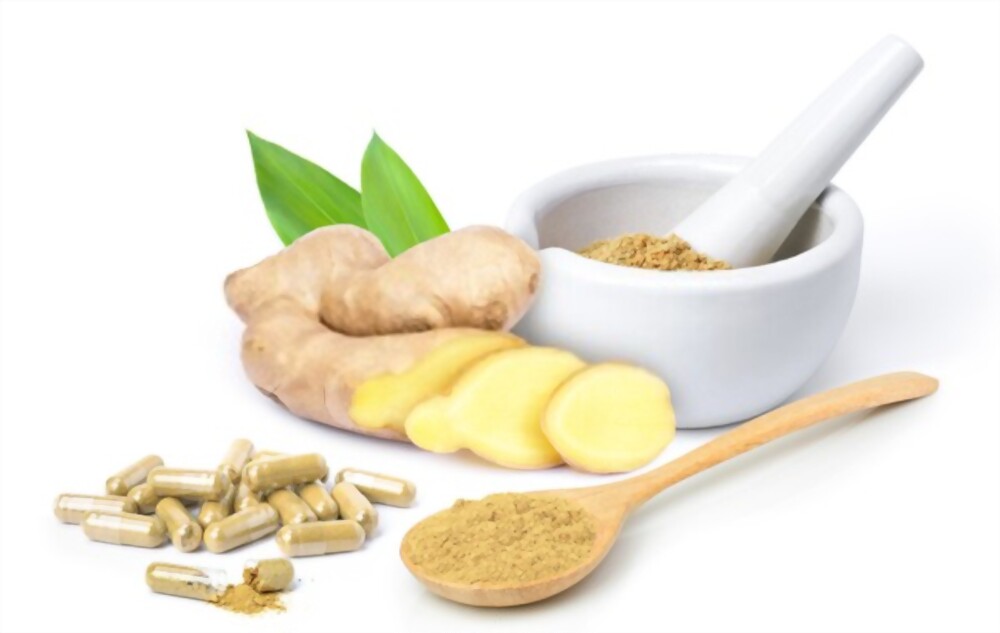
Pregnancy:
When ginger is taken by mouth for medical purposes during pregnancy, it is POSSIBLY SAFE. However, using it when pregnant is debatable. It is thought to have an effect on foetal sex hormones. A miscarriage has also been reported in a lady who took it for morning sickness during week 12 of her pregnancy.
Ginger, on the other hand, appears to be safe for pregnant women to take for morning sickness. The risk of serious abnormalities in children born to women who take it does not appear to be any higher than the typical 1% to 3%.
There is also no evidence of an increased risk of preterm labour or low birth weight. Because it has been linked to an increased risk of bleeding, several doctors advise against using it near to your due date. It’s critical to consider the benefits and risks of every drug administered during pregnancy. Consult your healthcare professional before taking it during pregnancy.
Breast-feeding:
There isn’t enough solid evidence on the safety of ginger consumption while breastfeeding. To be on the safe side, avoid using it.
Bleeding disorders:
It may raise your risk of bleeding if you have a bleeding problem.
Diabetes:
It may raise insulin levels and/or reduce blood sugar levels. As a result, your healthcare practitioner may need to modify your diabetic medicines.
Heart conditions:
High amounts of it may exacerbate the symptoms of some cardiac diseases.
Information about nutrition
Raw ginger has 79 percent water, 18 percent carbs, 2 percent protein, and 1% fat (table). It provides 333 kilojoules (80 kcal) of food energy per 100 grammes and includes modest quantities of vitamin B6 (12 percent DV) and the dietary minerals magnesium (12 percent DV) and manganese
(11 percent DV), but is otherwise poor in nutritional value (table).
With the exception of manganese, powdered dried ginger (9 percent water) supplies an insignificant quantity of vital elements when used as a spice powder in a usual serving size of one US tablespoon (5 grammes) (70 percent DV).
Also Read: Some Amazing Home Remedies for a Dry Cough – V Cure (vcurehealthcare.com)

